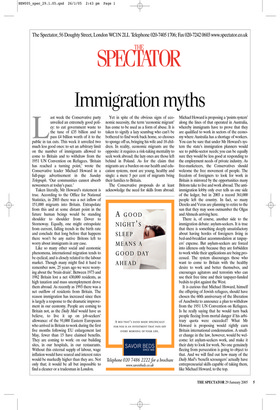Immigration myths
Last week the Conservative party unveiled an extremely good policy: to cut government waste to the tune of £35 billion and to pass £4 billion worth of it to the public in tax cuts. This week it unveiled two much less good ones: to set an arbitrary limit on the number of immigrants allowed to come to Britain and to withdraw from the 1951 UN Convention on Refugees. ‘Britain has reached a turning point,’ wrote the Conservative leader Michael Howard in a full-page advertisement in the Sunday Telegraph. ‘Our communities cannot absorb newcomers at today’s pace.’ Taken literally, Mr Howard’s statement is true. According to the Office for National Statistics, in 2003 there was a net inflow of 151,000 migrants into Britain. Extrapolate from this and at some distant point in the future human beings would be standing shoulder to shoulder from Dover to Stornoway. Equally, one might extrapolate from current, falling trends in the birth rate and conclude that long before that happens there won’t be any native Britons left to worry about immigrants in any case.
Like so many other social and economic phenomena, international migration tends to be cyclical, and is closely related to the labour market. Though many might find it hard to remember now, 25 years ago we were worrying about the ‘brain drain’. Between 1973 and 1982 Britain lost a net 430,000 residents, as high taxation and mass unemployment drove them abroad. As recently as 1993 there was a net outflow of residents from Britain. The reason immigration has increased since then is largely a response to the dramatic improvement in our economy. People are coming to Britain not, as the Daily Mail would have us believe, to live it up on job-seekers’ allowance: of the 91,000 Eastern Europeans who arrived in Britain to work during the first five months following EU enlargement last May, fewer than 15 have claimed benefits. They are coming to work: on our building sites, in our hospitals, in our restaurants. Without this external supply of labour, wage inflation would have soared and interest rates would be markedly higher than they are. Not only that; it would be all but impossible to find a cleaner or a tradesman in London. Yet in spite of the obvious signs of economic necessity, the term ‘economic migrant’ has come to be used as a form of abuse. It is taken to signify a lazy scumbag who can’t be bothered to find work back home, so chooses to sponge off us, bringing his wife and 18 children. In reality, economic migrants are the opposite: it requires a risk-taking mentality to seek work abroad; the lazy ones are those left behind in Poland. As for the claim that migrants are a burden on our health and education systems, most are young, healthy and single: a mere 5 per cent of migrants bring their families to Britain.
The Conservative proposals do at least acknowledge the need for skills from abroad. Michael Howard is proposing a ‘points system’ along the lines of that operated in Australia, whereby immigrants have to prove that they are qualified to work in sectors of the economy where Australia has a shortage of workers. You can be sure that under Mr Howard’s system the state’s immigration planners would see to public-sector needs; you can be equally sure they would be less good at responding to the employment needs of private industry. As free-marketeers, the Conservatives should welcome the free movement of people. The freedom of foreigners to look for work in Britain is mirrored by the opportunities many Britons take to live and work abroad. The antiimmigration lobby only ever tells us one side of the ledger, but in 2003 a record 361,000 people left the country. In fact, so many Dereks and Veras are planning to retire to the sun that they may soon outnumber the Olgas and Ahmeds arriving here.
There is, of course, another side to the immigration debate: asylum-seekers. It is true that there is something deeply unsatisfactory about having hordes of foreigners living in bed-and-breakfast accommodation at taxpayers’ expense. But asylum-seekers are forced into idleness only because they are forbidden to work while their applications are being processed. The system discourages those who want to come to Britain with the healthy desire to work and better themselves, and encourages agitators and terrorists who can use their free time and their taxpayer-funded bedsits to plot against the West.
It is curious that Michael Howard, himself the offspring of Jewish refugees, should have chosen the 60th anniversary of the liberation of Auschwitz to announce a plan to withdraw from the 1951 UN Convention on Refugees. Is he really saying that he would turn back people fleeing from mortal danger if his arbitrary quota were exceeded? What Mr Howard is proposing would rightly earn Britain international condemnation. A smaller change in the law, however, would be welcome: let asylum-seekers work, and make it their duty to look for work. No one genuinely fleeing from persecution is going to object to that. And we will find out how many of the Daily Mail’s ‘benefit scroungers’ actually have entrepreneurial skills capable of taking them, like Michael Howard, to the top.















































 Previous page
Previous page